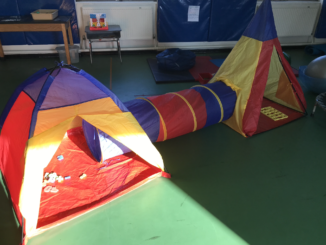Young children repeat the same thing over and over and over (like the same joke, the same observation, reading the same book, playing the same game…) because they are strengthening the connections in their brain that are learning from that repeated experience!
In addition to whatever they’re learning from the experience they’re repeating, they also learn valuable information about how to predict what’s going to happen next, and how changing small variables affects the outcome.
Here are some examples of what a toddler or preschooler might be picking up from a repeated experience:
From your point of view, you’re just reading the same book over and over and over — but from their point of view, they spend 10 days thinking about the story of the book, then 8 days noticing small details in the illustrations of the background of the book, then 5 days thinking about the way that your voice sounds when you read dialogue versus when you’re reading narration, then 10 days thinking about the emotions throughout the book, then 5 days thinking about the colors used in the pictures and how dark colors correlate with the “sad” pages and light colors correlate with the “happy” pages…
From your point of view, your preschooler just keeps telling the same knock-knock joke (that they don’t even understand) over and over — but from their point of view, they’re spending time understanding the social reciprocity — the back-and-forth — of how a joke works, and then they’re exploring who in their life does and does not know how to respond to a knock-knock joke (peers might not have been exposed to it, but adults probably have), and then they’re chasing the delightful rush of telling someone something that makes them laugh and delight in you a little bit, and then they’re expanding and exploring what words can be swapped in and out of a knock-knock joke to make people laugh even more…
From your point of view, your child gravitates toward running water in the sink as often as possible. From their point of view, one time they might be thinking about the feeling of the water running over their hands, and another time they might be listening to the sound of the water running, and another time they might be watching the visual of the water and how it cascades over any object it touches, and then they might be thinking about the temperature of the water, and then they might be thinking about the results of touching the water — how now their hands are cold and wet and the cause-and-effect that went into that…and then they might start branching out in their experiments with how the water runs over spoons or cups in the sink, or how the water drips slowly or gushes depending on how they’ve opened the faucet…
There are a million million things to learn from repeated experiences. Especially when you are very young!



